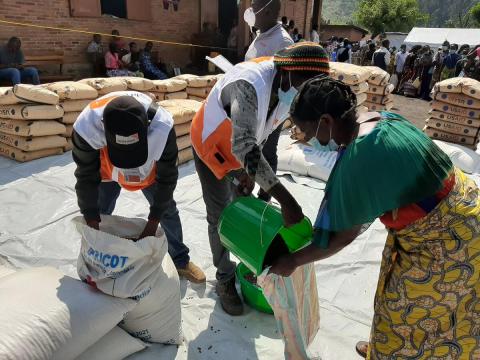
Dreaming a possible dream – excellence in all we do
By Stephen Lockley
I like order and logic. For everything to be in its place. So it’s not really a surprise that I have worked in finance for most of my professional life, and really enjoyed it.
But I also believe there is so much more to life than the things we can see in front of us. Partly because of my Christian faith, but also because I have seen what people are capable of when we don’t limit ourselves. This is why I came to work for a humanitarian organisation trying every day to do more, be better, try harder.
Sometimes pushing ourselves beyond what we believe is possible results in dramatic change, like getting aid through the most unimaginable circumstances to reach children and families no one else has. And sometimes it results in changes to systems and approaches that very few people know about, and that certainly don’t make for compelling photos on the front page of a newspaper, but still make a huge difference in ensuring we can help as many vulnerable children as possible.
I lead a few teams who are committed to this kind of change, and are achieving it every year. It helps to be very clear about what our mission is. In the corporate world, where many of us have worked, the mission is likely to involve maximising profit. In World Vision, it’s about maximising impact on the lives of vulnerable children, but the different mission doesn’t negate the importance of using best practices, techniques and tactics to get there. Having a mission in itself is not enough – how you get there matters as well, and I believe God calls us to be wholly professional and to strive for excellence in all of our work.
In finance and administration, that means keeping up with industry standards – and in some cases, setting them. Here are some ways we’re doing that:
- ‘Painting by numbers’
The great thing about working in finance and administration is that we have a lot of data passing through our systems. When I came into the Chief Financial Officer role six years ago, it quickly struck me that we were generating a lot of raw financial data but not really using it to paint a picture of the organisation’s financial health. So I encouraged my team to ‘paint by numbers’ drawing on industry best practice in the financial planning and analysis arena. That’s where we are now, thanks to a lot of work by the finance team in the last few years. Key to this was moving our core finance systems to the cloud. This has improved the ability of field offices and global teams to access data, aggregate it across the partnership and use PowerBI to generate bespoke reports to satisfy the diverse needs of multiple audiences. Needless to say, I’m pleased with the pictures we’re now painting with the numbers! - Cash is our lifeblood
Just like any other organisation, our ability to function depends on us effectively managing our cash flows. Operating in many of the world’s most challenging contexts means we have to manage additional risks to those cash flows, such as volatile foreign currencies or expensive and unreliable banking systems. To meet these risks, we have invested in a sector-leading Global Treasury team that manages our treasury and insurance needs. Continuing the theme of excellence, this team has won multiple external awards, beating off competition from leading corporations along the way (I’ll talk more about these awards in a future piece!). - Buying with confidence
We have high needs when it comes to a global system for procuring goods, tracking them, ensuring costs are paid. A few years ago, we re-organised our supply chain operations around a standardised procurement process using the market-leading platform Coupa (branded internally as ‘ProVision’). Having procurement done online via the cloud means we have much better visibility of what and how we spend, both in our development programmes and when we’re responding to crises such as COVID-19. The system, and the work we do around training and using it, helps to improve internal control and risk management, and reduce the risks of loss to error or fraud. When you operate in as many countries and changing contexts as we do, there are risks – small but still important – of procurement fraud, which makes it essential to have best-in-class systems and good controls. I am confident we do, and that the way we use is them also gives our teams confidence. - Enabled by technology
We cannot strive for excellence without fit-for-purpose digital and technology platforms. Working in 100 countries and with nearly 35,000 staff, finding the right platforms, and rolling them out to all areas of our operation – which include very remote locations, often with patchy internet and technology services – is no mean feat. Our global IT teams stay close to leading-edge digital thinking from business schools and technology experts to ensure we are leveraging the capabilities we need. From email platforms, to mobile banking to pay for goods and services in country, to tracking our suppliers and payments, better access to technology means more efficient operations, and ultimately improves our ability to save and change lives.
Our colleagues working in the field to support vulnerable children and communities regularly demonstrate that there is always a way through, you just have to find it. That’s what our work behind the scenes is all about. Our reason for being is not to have nice finance and administration systems; it’s to play our part in delivering impact, and finding ways through with excellence.
Stephen Lockley is World Vision’s Chief Administrative and Finance Officer. Follow Stephen on Twitter @Stephen_Lockley


